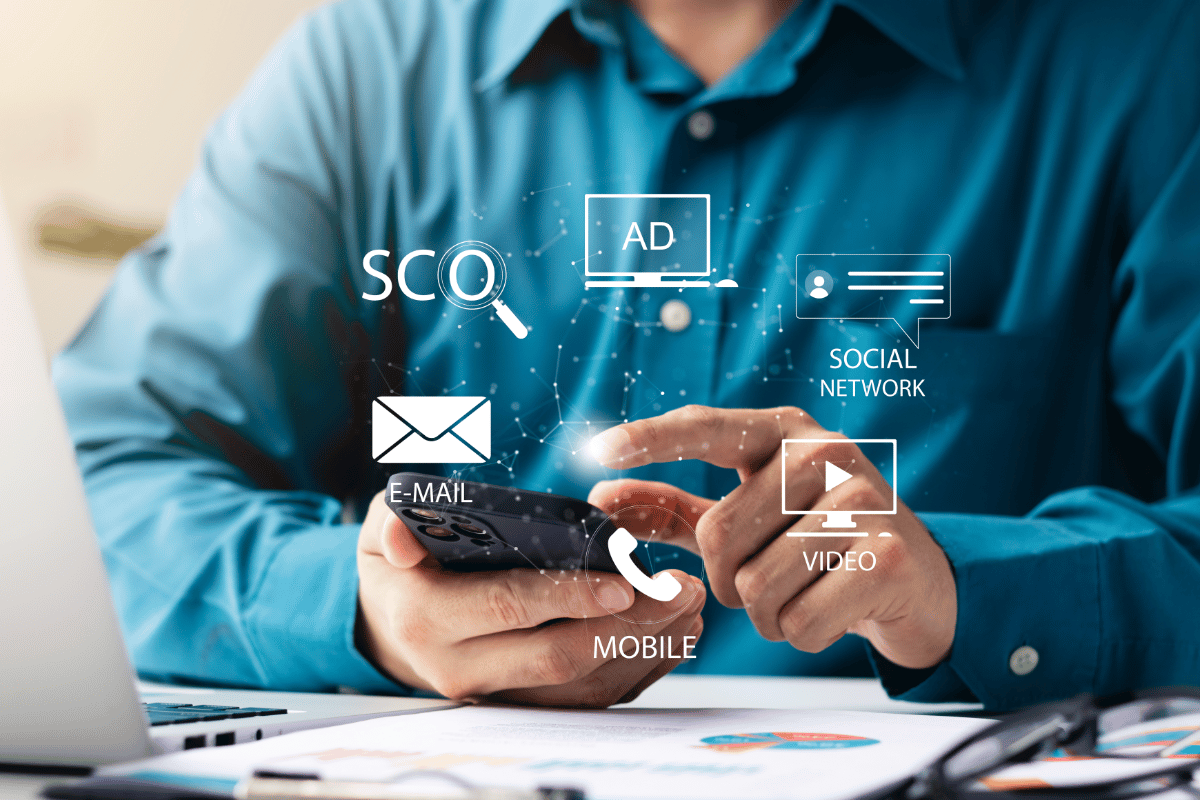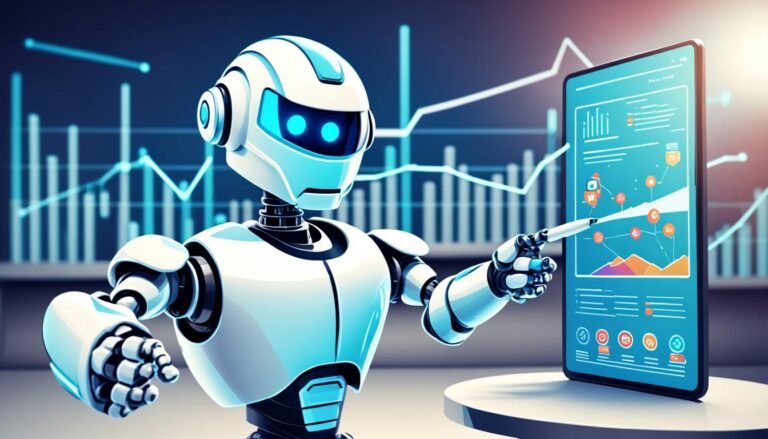The Role of AI in Enhancing Digital Marketing Efforts
Artificial Intelligence (AI) is no longer just a buzzword—it’s a game-changer for digital marketing. You’ve probably noticed how ads and content seem to know exactly what you want. That’s AI at work. From predicting customer behavior to personalizing your experience, AI is reshaping how businesses connect with consumers like you.
In this article, you’ll discover how AI is driving smarter marketing strategies, enhancing customer interactions, and optimizing campaigns. We’ll break down the tools and techniques making this possible and tackle the ethical challenges that come with them.
AI-Driven Customer Insights and Personalization
Leveraging AI for Customer Data Analysis
AI revolutionizes how businesses analyze customer data. You’ve likely experienced it firsthand. Companies gather vast amounts of information from your online interactions—browsing habits, purchase history, and even how long you linger on a page. AI steps in to process this data at lightning speed. What used to take weeks is now done in seconds. It doesn’t just collect the data; it understands it. AI identifies patterns and trends, helping businesses predict what you’ll want next. This level of insight is crucial in creating personalized experiences that feel uniquely tailored to you.
AI in Predictive Analytics for Marketing Strategies
Predictive analytics is where AI truly shines. By analyzing past behaviors and data, AI can predict future actions with impressive accuracy. Imagine knowing what your customers want before they even realize it themselves. That’s the power of AI in predictive analytics. It takes historical data and uses it to forecast trends, anticipate market changes, and fine-tune marketing strategies. This allows companies to stay ahead of the curve, optimizing campaigns for maximum impact. And it’s not just for large corporations—predictive analytics powered by AI is accessible to businesses of all sizes, making it an essential tool in the modern marketer’s toolkit.
Personalization Through AI: Tailoring Customer Experiences
Personalization is more than just adding a customer’s name to an email. AI takes it several steps further by analyzing your preferences, behavior, and even the time of day you’re most likely to engage. With this information, AI can create highly personalized content that speaks directly to you. Whether it’s product recommendations, personalized ads, or even dynamic website content, AI ensures you see what’s most relevant to you. This level of personalization not only enhances your experience but also boosts engagement and conversions. It’s all about making you feel understood and valued by the brands you interact with.
Behavioral Targeting with AI Algorithms
Behavioral targeting is another area where AI excels. By analyzing your online behavior, AI algorithms can segment audiences based on their actions rather than just demographic information. This allows for highly targeted marketing efforts that resonate with specific behaviors. For example, if you frequently search for a particular type of product, AI can ensure you see ads or content related to that interest. This kind of targeting is more effective because it’s based on what you do, not just who you are. AI-powered behavioral targeting makes marketing more relevant and less intrusive, improving your overall experience while maximizing business outcomes.
AI is also highly efficient at handling scalable object storage, enabling businesses to store and manage large amounts of data without sacrificing speed or performance. This scalability is crucial for businesses looking to leverage AI-driven insights effectively.
AI Tools and Techniques in Digital Marketing
AI-Powered Content Creation and Curation
Creating engaging content is crucial for keeping your audience interested. AI is making this easier and faster. With AI-powered tools, you can generate articles, blog posts, and even social media captions in seconds. These tools analyze what’s trending, your audience’s preferences, and even your brand’s tone of voice to create content that resonates.
But it’s not just about churning out text. AI also helps you curate content. It finds relevant articles, videos, and images from across the web, tailored to your audience’s interests. By using AI, you can keep your content fresh and relevant without spending hours on research.
Chatbots and AI in Customer Service
AI-powered chatbots are changing the way businesses interact with customers. Available 24/7, they provide instant responses to common questions, guide users through your website, and even handle simple transactions. For you, this means better customer service with less human effort.
These bots don’t just respond—they learn. Over time, they get better at understanding customer needs and providing personalized responses. The result? Happier customers and a more efficient support system.
AI-Enhanced Social Media Marketing
Social media is all about engagement, and AI is helping brands engage smarter. AI tools analyze your followers’ behavior, identifying the best times to post, the types of content that get the most interaction, and even predicting trends before they go viral.
You can also use AI to automate posts, ensuring your content goes live at the optimal moment. Plus, AI-driven analytics give you deeper insights into how your campaigns are performing, helping you tweak strategies in real-time.
Search Engine Optimization (SEO) with AI
If you want to rank higher on search engines, AI is your new best friend. AI-driven SEO tools analyze search engine algorithms and identify the keywords that will boost your rankings. They also monitor your website’s performance, suggesting improvements to content, meta tags, and even site structure.
But AI goes further. It can predict changes in search algorithms, helping you stay ahead of the competition. By automating keyword research and content optimization, AI makes SEO more efficient and effective, so you can focus on other areas of your business.
Programmatic Advertising and AI Automation
Programmatic advertising is all about getting the right ad in front of the right person at the right time. AI takes this to the next level by automating the entire process. It analyzes user data to identify potential customers, selects the best ad placements, and adjusts bids in real-time to maximize your ad spend.
AI also personalizes ads based on user behavior, increasing the chances of conversion. The result? More efficient campaigns that deliver better ROI with less manual effort.
Measuring and Optimizing Marketing Campaigns with AI
AI in Marketing Performance Analytics
You can’t improve what you don’t measure. AI takes the guesswork out of marketing performance by providing real-time analytics that break down the effectiveness of your campaigns. Instead of sifting through data manually, AI tools analyze vast amounts of information in seconds, identifying which strategies are working and which aren’t. This means you can quickly pivot and refine your approach, saving time and resources. AI’s ability to detect patterns in data helps you understand customer behavior on a deeper level, leading to more targeted and successful marketing efforts.
A/B Testing and AI: Enhancing Campaign Effectiveness
A/B testing is essential for optimizing your marketing strategies, and AI is making it smarter and faster. Traditional A/B testing requires testing one variable at a time, but with AI, you can test multiple variables simultaneously. AI analyzes the data from these tests to identify which combination of elements—like headlines, images, and calls to action—performs best. This speeds up the testing process and improves the accuracy of your results. With AI, you can make more informed decisions that enhance your campaign’s effectiveness, ensuring your marketing efforts are always on point.
AI for Real-Time Campaign Adjustments
In marketing, timing is everything. AI allows you to make real-time adjustments to your campaigns based on up-to-the-minute data. If a campaign isn’t performing as expected, AI can automatically tweak various elements—like targeting parameters or ad placement—to improve results on the fly. This ability to pivot in real time means you’re not stuck with underperforming ads or strategies. Instead, AI helps you stay agile, continuously optimizing your campaigns for better performance and higher ROI.
Predicting Campaign ROI with AI
Predicting the return on investment (ROI) for your campaigns has always been a challenge. AI makes it easier by analyzing historical data and current market trends to forecast future outcomes. By considering a wide range of factors, AI can provide more accurate predictions, helping you allocate your budget more effectively. Whether you’re planning a new campaign or assessing an ongoing one, AI’s predictive capabilities give you a clearer picture of your potential ROI, allowing you to make smarter, data-driven decisions.
Ethical Considerations and Challenges in AI Marketing
Privacy Concerns and AI in Marketing
AI in marketing brings a lot of power, but it also raises significant privacy concerns. When your data is collected, analyzed, and used to tailor marketing efforts, there’s always a risk of misuse. To protect user information, implementing a secure protocol is essential. A secure protocol ensures that your personal data—like browsing habits or purchase history—remains safe from unauthorized access.
With increasing regulations like GDPR and CCPA, companies need to be extra vigilant. If privacy isn’t properly managed, businesses can face heavy fines and lose customer trust. AI systems must comply with these regulations, which means clear consent forms, data encryption, and anonymization techniques should be standard. These steps help prevent breaches and reassure users that their information is handled responsibly.
Avoiding Bias in AI Algorithms
AI algorithms are only as good as the data they’re trained on. If that data is biased, the AI’s decisions will be too. This can lead to unfair targeting in marketing campaigns, where certain groups are either excluded or overly targeted based on skewed data.
To avoid this, you need to ensure that the data feeding into AI systems is diverse and representative. Regular audits of AI models can help identify and correct any biases that might slip through. It’s not just about being fair—it’s about making sure that your marketing reaches the right people without unintended discrimination. Bias in AI can damage a brand’s reputation, so it’s crucial to address this issue head-on.
Transparency and Trust in AI-Driven Campaigns
AI might be powerful, but it’s also a black box to many. Users want to know how their data is being used and how decisions are made. Transparency in AI-driven marketing campaigns is key to building trust.
Make it clear when AI is in play. Whether it’s through personalized ads or automated customer service, transparency helps users feel more in control. Share how data is collected, how AI processes it, and the outcomes it drives. When users understand these processes, they’re more likely to trust your brand. Moreover, transparent AI use can lead to better customer engagement and loyalty.
Balancing Automation and Human Touch in Marketing
While AI can handle a lot, it can’t replace the human touch. Striking the right balance between automation and personal interaction is critical. Automated systems can manage routine tasks efficiently, but when it comes to complex issues or building relationships, human involvement is irreplaceable.
Conclusion
AI is rapidly transforming digital marketing, offering new ways to engage with your audience and optimize your strategies. It’s not just about keeping up—it’s about getting ahead. With AI, you can tap into deeper customer insights, personalize your messaging, and automate repetitive tasks.
But it’s essential to remember the challenges. Ethical considerations, like privacy and bias, should be at the forefront of any AI-driven campaign. Balance automation with the human touch to maintain trust and authenticity.
As AI continues to evolve, so will its impact on digital marketing. By staying informed and adaptive, you can leverage AI to create smarter, more effective marketing strategies that resonate with your audience.







